|
|
|
Sort Order |
|
|
|
Items / Page
|
|
|
|
|
|
|
| Srl | Item |
| 1 |
ID:
078948
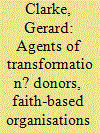

|
|
|
|
|
| Publication |
2007.
|
| Summary/Abstract |
Recent donor discourse points to the potential of faith-based organisations (fbos) as 'agents of transformation', mobilising the moral energy of faith communities in support of the Millennium Developments Goals (mdgs). This new donor-driven agenda, however, invites scrutiny of complementary processes of organisational change within donor institutions. This article therefore examines donor policy and practice concerned with engagement with fbos. While considering the work of a number of donors, it focuses on the UK Department for International Development (dfid) and traces the reasons for dfid's growing interest in fbos from 1997. It examines the challenges which dfid faces in further developing this engagement and considers whether it and others donors can themselves become 'agents of transformation', embracing a less material and less secular vision of well-being and a more culturally inclusive approach to partnership. In contrast to recent scholarship, which presents a benign view of the emerging 'faith and development' interface, this article considers it as a controversial new Zeitgeist in development policy and discourse.
|
|
|
|
|
|
|
|
|
|
|
|
|
|
|
|
| 2 |
ID:
124876
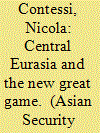

|
|
|
|
|
| Publication |
2013.
|
| Summary/Abstract |
In the 20 years since independence from the former Soviet Union, the study of Eurasia in International Relations (IR) has received considerable impetus in both the academic and policy circles. Specialized news and analysis outlets have come online, research centers have multiplied within universities, and a variety of think tanks now host dedicated programs. In other words, this still relatively little-known region has glamour. Yet Eurasia remains difficult to situate as an object of study due to its distinctive hybridity: geographical, at the crossroads between Europe and Asia; cultural, Muslim Russianspeaking Turkic peoples with Asian traits and traditions; political, straddling Western and Asian institutional forms domestically, and contiguous to Europe, Asia, Russia, the Middle East, and Afghanistan internationally. Partly as a result of this hybridity, Eurasia is a somewhat elusive object of study. At a minimum, it comprises the two subregions on each shore of the Caspian basin: Central Asia to the east and the Caucasus to the west. Reflecting this elusiveness, Central Asian states (CAS) belong to the Asia-Pacific Regional Group at the United Nations; they are members of the Asian Development Bank and the Economic Commission for the Asia-Paci?c. At the same time, they are members of the Organization for Security and Cooperation in Europe (OSCE), the European Bank for Reconstruction and Development, and the Euro-Atlantic Partnership Council, a North Atlantic Treaty Organization (NATO) ancillary forum. But they also have distinctly Central Asian groupings, such as the Eurasian Development Bank, the UN-af?liated Central Asian Regional Information and Coordination Center, not to mention the Shanghai Cooperation Organization (SCO) and Collective Security Treaty Organization (CSTO). Similarly, the three Caucasian states share most of the same af?liations, except for belonging to the East European Regional Group at the UN
|
|
|
|
|
|
|
|
|
|
|
|
|
|
|
|
| 3 |
ID:
082641
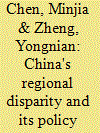

|
|
|
| 4 |
ID:
132678
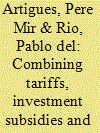

|
|
|
|
|
| Publication |
2014.
|
| Summary/Abstract |
Policy combinations and interactions have received a considerable attention in the climate and energy policy realm. However, virtually no attention has been paid to the analysis of the combination of different deployment instruments for the same renewable energy technology. This neglect is all the more striking given the existence in current policy practice of combinations of deployment instruments either across technologies or for the same technology, both in the EU and elsewhere. What renewable electricity support policies to use and, therefore, how to combine them in order to promote the deployment of renewable energy technologies cost-effectively is a main concern of governments. The aim of this paper is to provide insight on the cost-effectiveness of combinations of deployment instruments for the same technology. A financial model is developed for this purpose, whereby feed-in tariffs (FITs) are combined with investment subsidies and soft loans. The results show that the policy costs of combinations are the same as for the FITs-only option. Therefore, combining deployment instruments is not a cost-containment strategy. However, combinations may lead to different inter-temporal distributions of the same amount of policy costs and, thus, differently affect the social acceptability and political feasibility of renewable energy support.
|
|
|
|
|
|
|
|
|
|
|
|
|
|
|
|
| 5 |
ID:
071920
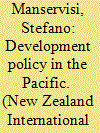

|
|
|
| 6 |
ID:
154076
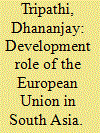

|
|
|
|
|
| Summary/Abstract |
The paper provides a comprehensive analysis of EU’s development policy in South Asia. The paper covers the approach, method and theories of development assistance and evaluates it by studying the development role of the EU in South Asia. For a focused discussion, the EU’s development programmes in Pakistan, Bangladesh, India and Afghanistan are highlighted in this paper.
|
|
|
|
|
|
|
|
|
|
|
|
|
|
|
|
| 7 |
ID:
107195
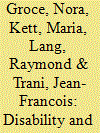

|
|
|
|
|
| Publication |
2011.
|
| Summary/Abstract |
The international development community is beginning to recognise that people with disabilities constitute among the poorest and most vulnerable of all groups, and thus must be a core issue in development policies and programmes. Yet the relationship between disability and poverty remains ill-defined and under-researched, with few studies providing robust and verifiable data that examine the intricacies of this relationship. A second, linked issue is the need for-and current lack of-criteria to assess whether and how disability-specific and disability 'mainstreamed' or 'inclusive' programmes work in combating the exclusion, marginalisation and poverty of people with disabilities. This article reviews existing knowledge and theory regarding the disability-poverty nexus. Using both established theoretical constructs and field-based data, it attempts to identify what knowledge gaps exist and need to be addressed with future research.
|
|
|
|
|
|
|
|
|
|
|
|
|
|
|
|
| 8 |
ID:
127239


|
|
Environmental and self-sufficiency assessment of the energy met: the case of Menorca (Spain)
/ Mengual, Esther Sanyé; Romanos, Héctor; Molina, Catalina; Oliver, Antònia M, Ruiz, Núria, Pérez, Marta , Carreras, David, Boada, Martí, Orellana, Jordi Garcia, Duch, Jordi, Rieradevall, Joan
|

|
|
|
|
| Publication |
2014.
|
| Summary/Abstract |
Energy performance of island tourism has been analyzed in the literature. However, tourist services tend to concentrate in tourist hubs, especially where mass tourism predominates (e.g., Mediterranean), and the energy metabolism of these systems has not yet been assessed. The present paper models and estimates the energy metabolism of tourist hubs in the Menorca Island (Spain) by integrating social, geographical and environmental methods. Mobility (both external and internal) and consumption of lodging services were characterized through surveys to users (tourists) and business managers. An environmental assessment evaluated CO2 emissions, and energy self-sufficiency potential was estimated via GIS data. The results indicate that, on average, a tourist consumes 4756 MJ with associated emissions of 277 kg of CO2 per stay (20 days on average). Of all the energy flows, external mobility contributes the most to total emissions (77%). For every day spent in a tourist hub, a tourist consumes between 29 MJ and 93 MJ in lodging services, consumption that could be 100% satisfied by photovoltaic systems, and these systems would result in positive effects for the island. Sustainable tourism management might focus on promoting environmentally friendly transportation, energy efficient practices, and environmental communication through ecolabeling.
|
|
|
|
|
|
|
|
|
|
|
|
|
|
|
|
| 9 |
ID:
126627
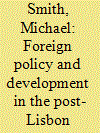

|
|
|
|
|
| Publication |
2013.
|
| Summary/Abstract |
The European Union (EU) has a long tradition of involvement in development policy and can claim to be the world's most influential donor when the activities of its member states are aggregated. Recently, however, this position has been challenged by the rise of new donors and models of development assistance, by the changing needs and positions of recipients and by institutional change within the EU itself. This article explores these issues by focusing first on the nature of EU foreign policy, and then on the ways in which it has interacted with the changing trajectory of development policies to create new issues and problems. It concludes that the EU's position remains central and significant to global development policy, but that this position faces important challenges to which the response is as yet uncertain.
|
|
|
|
|
|
|
|
|
|
|
|
|
|
|
|
| 10 |
ID:
131350
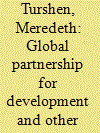

|
|
|
|
|
| Publication |
2014.
|
| Summary/Abstract |
This article revisits the United Nations Millennium Development Goals (mdgs) set in 2000, timely now because policy makers are currently making plans for the period after 2015. After laying out a critical analysis of the mdgs, the article focuses on Millennium Goal 8, the global partnership for development. The argument made is that the absence of any goal to reset the asymmetrical power relations between the North and the South reveals the limitations of the endeavour. The pharmaceutical industry is discussed in detail because mdg8/Target 6 deals with access to affordable, essential drugs in developing countries. This target seems emblematic of a problem found throughout the millennium project: the unaddressed need for real economic development. Target 6 exemplifies both North-South and public-private conflicts of interest, which are carefully hidden in official documents behind the euphemism of 'partnership', as if countries of such unequal power could be partners.
|
|
|
|
|
|
|
|
|
|
|
|
|
|
|
|
| 11 |
ID:
131356


|
|
|
|
|
| Publication |
2014.
|
| Summary/Abstract |
This paper explores recent efforts to ensure the participation of indigenous peoples in the making of the post-2015 development agenda. It is based on an examination of the UN's global consultation process, conducted between July 2012 and July 2013. Using discursive analysis of consultation findings and reports, we argue that the UN's approach to participatory development represents a pretence rather than an actual shift in power from development experts to the intended beneficiaries of development. Therefore the post-2015 consultation process aptly illustrates the recurring tyranny of participation, this time at a global level, as the UN maintains control over global development goals. Recognising that it would be unjust to ignore the ability of marginalised groups to challenge the UN's dominant narratives of development, we suggest that there is still time for indigenous voices to be heard in the build-up to the post-mdg era through 'invited' and 'uninvited' forms of participation.
|
|
|
|
|
|
|
|
|
|
|
|
|
|
|
|
| 12 |
ID:
132664
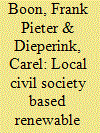

|
|
|
|
|
| Publication |
2014.
|
| Summary/Abstract |
In order to alleviate urgent and pressing environmental issues, a transition towards decentralised production and consumption of renewable energy is necessary. The establishment of local renewable energy organisations (LREO) can stimulate this transition. In the recent past the number of LREOs has grown substantially in the Netherlands. However, due to their recent emergence little is known about the factors that stimulate or hamper their appearance and development. This research addresses this knowledge gap. Based on a literature review and five expert interviews, explanatory variables that might determine the emergence and development of LREOs were identified. Second, a first assessment of the factors that stimulate the emergence and development of 26 Dutch LREOs is made. Face-to-face interviews as well as an online questionnaire were used to validate this assessment. We conclude this paper with some recommendations for policy makers and LREOs.
|
|
|
|
|
|
|
|
|
|
|
|
|
|
|
|
| 13 |
ID:
110894
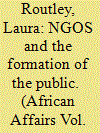

|
|
|
|
|
| Publication |
2012.
|
| Summary/Abstract |
This article examines the formation of 'the public' or 'the people' as negotiated by a small number of national NGOs in eastern Nigeria. The ways in which these NGOs conceive of 'the people' or 'the public' and the actions they undertake are often at odds with conceptions of 'the public interest' implicit in much development policy. At the same time, their actions do not conform to a moral economy governed by obligations to primordial groups. Instead, this article argues that the NGOs are seeking a particular kind of accountability from the state, and concludes that the forms of accountability pursued by NGO workers provide important insights into how the Nigerian state is perceived and ultimately produced.
|
|
|
|
|
|
|
|
|
|
|
|
|
|
|
|
| 14 |
ID:
163238


|
|
|
|
|
| Summary/Abstract |
Myanmar (formerly Burma) is emerging from almost six decades of international isolation into a period of rapid economic growth. Following moves towards increasing democratisation since 2011, Myanmar's tourism industry has been propelled from ‘tourism pariah’ to rising ‘tourism star’ and is experiencing an extraordinary growth in tourism arrivals with associated revenues and investment. The unique rapidity of Myanmar's recent transition enables an examination of how contemporary forces of globalisation and neoliberalism determine the direction and mode of tourism development from its beginnings. We show how tourism is perceived by the national government as an engine for rural development, conservation and livelihood creation for poor and rural communities. We then demonstrate how this is re‐shaped by a globalised tourism industry into a socially and economically exclusive model which capitalises upon weak governance and disempowered local stakeholders. We conclude with observations which may point towards a more sustainable and responsible tourism industry.
|
|
|
|
|
|
|
|
|
|
|
|
|
|
|
|
| 15 |
ID:
132315
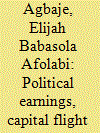

|
|
|
|
|
| Publication |
2014.
|
| Summary/Abstract |
Politicking ranks the most lucrative preoccupation in sub-Sahara Africa generally, and Nigeria specifically. This logically derives from the central role of the state in socioeconomic processes. The public sector, by its size and share of the communal wealth, remains the most potent means of empowering nations for development. Reviewing 12 years of democratic rule in Nigeria, this paper examines the relationship between political earnings, capital flights and economic development with disappointing findings that the economic mix of political earnings constitutes a cog rather than being a catalyst of development in Nigeria. Identifying constitutional, societal and other systemic disincentives as major inhibitive factors, the paper advance measures by which local reinvestment of political earnings could be encouraged to contribute to current efforts at accelerated national development
|
|
|
|
|
|
|
|
|
|
|
|
|
|
|
|
| 16 |
ID:
180249
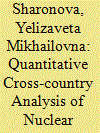

|
|
|
|
|
| Summary/Abstract |
Nuclear power has always been a controversial issue since it was discovered as a source of power for civil use. Despite being a global phenomenon, nuclear power is viewed differently around the world, and consequently, different discourses have had different outcomes. This study does a comparative analysis of nuclear power discourses between India and Russia, two countries of distinct political systems. This study analyses the media coverage and content of the main discourse themes in India’s and Russia’s print media from March 2011 to March 2019. The study finds that in both countries, despite their different political set-ups, nuclear power discourse has a pro-nuclear character.
|
|
|
|
|
|
|
|
|
|
|
|
|
|
|
|
| 17 |
ID:
132038
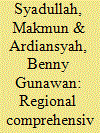

|
|
|
| 18 |
ID:
111485
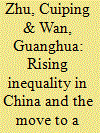

|
|
|
|
|
| Publication |
2012.
|
| Summary/Abstract |
China faces serious external (i.e. trade) and internal (i.e. structural) imbalances. Both are related to income inequality, reduction of which will help to increase domestic demand. This paper discusses how income inequality has evolved over time. This is followed by an exploration of the consequences of high inequality. Driving forces underlying the rising inequality are analyzed before providing concrete policy recommendations. It is found that inequality declined in the early period of reform, until the mid to late 1980s, and then began a rising trend up to 2010. Major determinants of inequality include: location, institutional and policy factors, trade and globalization, and education inequality and human capital gaps along rural-urban and spatial divisions. To achieve a balanced economy and a harmonious society, development policies in China must shift from emphasizing growth to prioritizing equality. In addition, government interventions can target rural-urban disparity through rapid urbanization, and tackle regional inequality by developing financial markets, ensuring progressive allocation of fiscal resources, promoting trade and foreign direct investment in inland China, creating more formal jobs and supporting the service sector.
|
|
|
|
|
|
|
|
|
|
|
|
|
|
|
|
| 19 |
ID:
075084
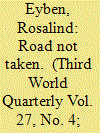

|
|
|
|
|
| Publication |
2006.
|
| Summary/Abstract |
A decade after the United Nations conferences on gender equality and social development, this paper explores their policy origins and discusses their differential impact on international aid since 1995. The author draws on her direct experience to consider why Copenhagen led to Poverty Reduction Strategies and the first Millennium Development Goal, whereas Beijing has become largely invisible in the mainstream world of aid. She argues that the powerful influence of economic rational choice theory associated with bureaucratic modes of thought has meant that the central debate in development policy has remained that of growth versus equity. Beijing's agenda of societal transformation offered another paradigm of development that has remained marginal. The paper concludes with a proposal. If international aid policy could handle more than one paradigm and thus be more open to different ways of thinking about economy, society and politics, aid agencies would be better able to support transformative processes for social justice.
|
|
|
|
|
|
|
|
|
|
|
|
|
|
|
|
| 20 |
ID:
183374


|
|
|
|
|
| Summary/Abstract |
Over less than a century, the majority of the once nomadic Bedouin of southern Israel were moved to live in towns that were established for them by the state, in the process of urbanization. These towns are far from satisfying the desires and needs of all the Bedouin. The rest of the Bedouin prefer to live outside the towns in a rural space. Based on archival sources the study reveals that the early policy supported the establishment of rural agricultural villages and transferring all Bedouin into fellahin (peasants). This policy was only later changed towards urbanization, a change that brought a problematic outcome. At the core of this study is an attempt to trace the reasoning that stood behind these policies and to make an analysis of their development and implementations
|
|
|
|
|
|
|
|
|
|
|
|
|
|
|
|
|
|
|
|
|